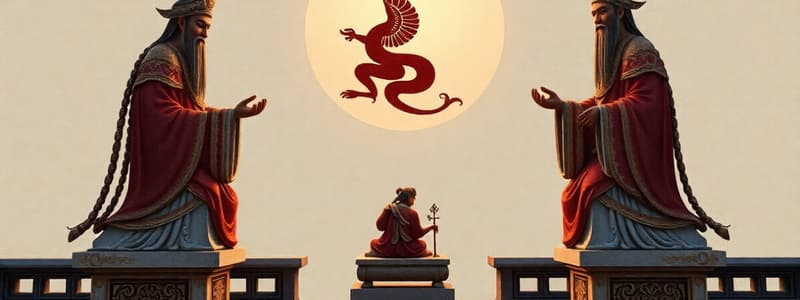Podcast
Questions and Answers
What is the central concept of Daoism, as described in the text?
What is the central concept of Daoism, as described in the text?
- Harmony with the natural order of the universe. (correct)
- Strict adherence to rules and laws.
- Cultivation of violence and struggle.
- The pursuit of wealth and power.
What does 'wu wei' mean in the context of Daoism?
What does 'wu wei' mean in the context of Daoism?
- Yielding to the natural order and avoiding conflict. (correct)
- The pursuit of personal glory.
- Complete inactivity and laziness.
- Aggressive action to achieve goals.
What is 'ziran' in Daoist philosophy?
What is 'ziran' in Daoist philosophy?
- A sense of naturalness and being in tune with the Dao. (correct)
- A sense of artificiality and manipulation.
- A system of rewards and punishments.
- A complex set of social rules.
The Dao De Jing emphasizes the importance of what?
The Dao De Jing emphasizes the importance of what?
What is the general accepted view of the author of the Dao De Jing?
What is the general accepted view of the author of the Dao De Jing?
Why might the text present an image of Laozi meeting with Confucius?
Why might the text present an image of Laozi meeting with Confucius?
What is the main difference between Daoism and other belief systems?
What is the main difference between Daoism and other belief systems?
What concept best represents the Daoist idea of how to live and interact with the world?
What concept best represents the Daoist idea of how to live and interact with the world?
What is the Daoist perspective on Confucian emphasis on strict rules?
What is the Daoist perspective on Confucian emphasis on strict rules?
What does the image of uncarved wood represent in Daoism?
What does the image of uncarved wood represent in Daoism?
How did Daoists generally regard political power?
How did Daoists generally regard political power?
What was a key aspect of the lifestyle promoted by Daoists?
What was a key aspect of the lifestyle promoted by Daoists?
What does the Dao De Jing suggest in the excerpt regarding daily life?
What does the Dao De Jing suggest in the excerpt regarding daily life?
How did Daoists view the importance of family compared to Confucianists?
How did Daoists view the importance of family compared to Confucianists?
What unique perspective did Daoism hold regarding women compared to Confucianism?
What unique perspective did Daoism hold regarding women compared to Confucianism?
Which activity is NOT mentioned in the text as a practice employed by Daoists?
Which activity is NOT mentioned in the text as a practice employed by Daoists?
Flashcards
Daoist Way of Living
Daoist Way of Living
Daoism's concept of living in harmony with nature, focusing on simplicity, spontaneity, and non-interference.
Nature's Control Over Change
Nature's Control Over Change
Daoist perspective that nature, not humans, is the ultimate force shaping change.
Daoist Critique of Confucianism
Daoist Critique of Confucianism
Daoist view of Confucian emphasis on rules and social structures as unnecessary and artificial.
Uncarved Wood
Uncarved Wood
Signup and view all the flashcards
Daoist Meditation
Daoist Meditation
Signup and view all the flashcards
Daoist Simplicity
Daoist Simplicity
Signup and view all the flashcards
Daoist Family Values
Daoist Family Values
Signup and view all the flashcards
Daoist Rejection of Technology
Daoist Rejection of Technology
Signup and view all the flashcards
Daoism
Daoism
Signup and view all the flashcards
The Dao
The Dao
Signup and view all the flashcards
Wu Wei
Wu Wei
Signup and view all the flashcards
Ziran
Ziran
Signup and view all the flashcards
Dao De Jing
Dao De Jing
Signup and view all the flashcards
Laozi
Laozi
Signup and view all the flashcards
Balance between Opposites
Balance between Opposites
Signup and view all the flashcards
Yielding to the Natural Order
Yielding to the Natural Order
Signup and view all the flashcards
Acting Without Expectation
Acting Without Expectation
Signup and view all the flashcards
Study Notes
Daoism
- Daoism, also known as Taoism, is an ancient Chinese belief system emphasizing harmony with the natural order of the universe.
- Daoism is different from other belief systems as it avoids strict rules and laws and instead emphasizes wu wei, meaning "inaction" but not non-action, but instead aligning with the Dao (the natural order).
- The Dao is the natural order, and Daoists try to live in harmony with it through cultivating a sense of naturalness called ziran.
- This harmony aims to prevent conflict, suffering, and struggle.
Daoist Beliefs
- Daoist practices include rituals, dietary restrictions and laws.
- Daoists oppose strict rules in favor of adapting to the natural order.
- Wu wei, a key concept, means "non-action" in the sense of acting in accordance with the natural order, not avoiding action altogether.
- Daoists value harmony between opposites, embodied in the yin and yang concept.
- Daoism emphasizes the importance of yielding to the natural order, rather than imposing rules.
Daoism and Society
- Daoists historically avoided direct involvement in politics, favoring living simply and in harmony with nature.
- Wealth, status, and fame were not prioritized in the Daoist lifestyle. Communities were often self-sufficient.
- Daoists emphasized natural processes over human intervention and believed that human laws and interventions have less importance than the natural order.
Daoist Symbols
- The image of uncarved wood represents simplicity, naturalness, and a rejection of human intervention or artifice.
- The yin and yang symbol represents the interconnectedness and balance of opposing forces in nature.
Studying That Suits You
Use AI to generate personalized quizzes and flashcards to suit your learning preferences.





